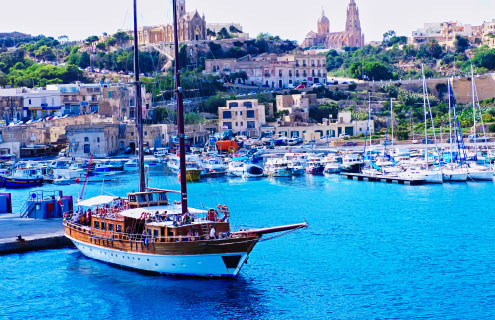Captives establishing in Malta benefit from a number of advantages, including: a politically stable environment; a robust regulatory framework; efficient fiscal legislation; and passporting rights within the EU.
Mario Buttigieg
Senior manager of the financial institutions group
HSBC Bank Malta
George Mangion
Senior partner and head of the audit department
PKF Malta
What are the advantages of domiciling a captive in Malta?
Mario Buttigieg: Captives establishing in Malta benefit from a number of advantages, including: a politically stable environment; a robust regulatory framework; efficient fiscal legislation; and passporting rights within the EU.
An additional and unique advantage for Malta is that it is the only EU member state that has the necessary legislation that enables insurers to carry on their business, including the business of insurance manager, insurance broking, reinsurance and captives through the set-up of a protected cell company (PCC) with cells.
The PCC law caters for the formation of multiple cells forming part of a single company and the creation and issue of cell shares. It also allows the segregation and protection of cellular assets from other assets of the company, the transfer of cellular assets, and the use of non-cellular assets as a secondary asset base where cellular assets are exhausted.
A PCC’s main advantages are that it offers insurers and reinsurers the opportunity to write business at cell level while benefiting from the economies of scale derived from its core and other cells. It is also not necessary to satisfy the minimum guarantee fund at the cell (individual) level, but only at the PCC (whole) level.
Furthermore, a PCC is taxable at the cell level and is able to declare a dividend through its cell, even if the other cells within the PCC are not able to do so.
The PCC business model can take different forms, ranging from non-European insurers setting-up cells as fronting facilities to reduce their European fronting costs, to companies establishing captives risk financing vehicle.
George Mangion: There have not been many developments in Malta so far this year, though there has been increased interest by owners to seek the advantages of the island.
More than six Fortune 100 companies have captives in Malta and a raft of companies from across the world and in numerous sectors are being well looked after by the country’s insurance managers.
The global names of Aon, Marsh, JLT, Willis and Heath Lambert can be found assisting owners of indigenous insurance management companies. The advantages of relocating to Malta are numerous and include international banks, professional fund managers, insurance managers, call centres, stockbrokers and wealth managers.
Moreover, the island is now targeting the insurance-linked securities, catastrophe bond and reinsurance convergence sectors with a legislative effort to put in place a legal framework allowing for the formation and domicile of special purpose reinsurance vehicles (SPRV) in Malta.
Last year, the Malta Financial Services Authority (MFSA) put forward for consultation a draft version of the SPRV regulations. The consultation period is now closed and the MFSA is in the process of considering the responses received before it is expected to deliver feedback and an updated version of the law, which will likely be passed on to parliament for implementation.
What are the looming regulatory concerns for the island’s captive managers and owners?
Mangion: Captive managers in Malta are remarkably positive about Solvency II, perhaps because the end is in sight, and they and their clients have, in effect, done all the hard work. In a recent survey, respondents have shown that they are well prepared to embrace Solvency II with all its increased governance requirements, in part because operators have been subjected to quality regulation for 10 years, so they have done the necessary tests and are poised for the changeover.
Captive owners are confident that they have surpassed the learning curve, and are now in the implementation period and shall reap the benefits of recent preparations. They are proud to say that the common perception is that there is now well-developed expertise in the cost-effective application of Solvency II to suit particular clients’ needs. Furthermore, the concept of risk-based supervision is spreading beyond the EU, so one hopes that other offshore domiciles such as Guernsey will be playing catch-up with onshore EU domiciles.
Buttigieg: While the landscape for captive managers and owners is generally stable, regulatory issues and uncertainties will inevitably attract the industry’s attention.
Captives are more sensitive to the burden imposed by regulation than other sectors of the insurance industry. Captive owners are generally non-financial service groups and use a captive as an efficient way of accessing the reinsurance markets and generally managing group risks.
Apart from the opportunity costs, increased regulation can mean increased staff cost through increased time commitment and/or increased fees to managers and advisers. Increased regulation may also represent a greater risk profile because if the captive cannot comfortably comply with the increased regulatory requirements, it may face reputational damage and/or regulatory sanctions.
As an EU member state, the key regulatory change for the Maltese captive sector is the implementation of Solvency II. However, this impact is expected to be a contained one, mainly due to the unique advantages of PCCs, as explained above, which could translate this perceived threat into a material opportunity for Malta.
The risk management implications of the rising exposure to emerging markets are allegedly driving European companies to increase their use of multinationals. Is this trend present in Malta?
Buttigieg: On an international level, multinational programmes are rapidly becoming the industry standard and Malta has managed to attract large and reputable multinationals and insurance managers.
This growing internationalisation could potentially expose multinationals to greater complexity and, unless they are large enough to have their own comprehensive multinational programme, they can do so through one of the specialised insurance managers entrusted with monitoring developments and developing solutions.
HSBC is the leading international bank in Malta and our clients are telling us that we are number one in the institutional sector.
We enjoy strong relationships with the major multinational and insurance managers on the island, both locally and globally, and we are supporting Malta’s growth as a financial centre.
Mangion: It is not that apparent whether this trend is growing, but using a comprehensive multinational programme is usually a better solution. Owners of captives in Malta are waking up to the realisation about incremental management implications relating to exposure to risks.
For this and other reasons, there is a general consensus that companies strive to achieve consistent, compliant insurance cover. Certainly in this kind of environment, it is becoming more difficult to use traditional approaches such as relying on a single global policy or a patchwork of uncoordinated local arrangements.





